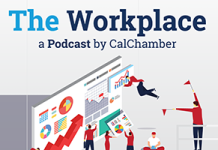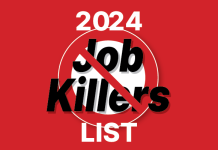In this episode of The Workplace podcast, CalChamber Executive Vice President and General Counsel Erika Frank, and employment law expert Jennifer Shaw discuss the responsibilities small employers have under the Emergency Family Medical Leave Expansion Act (EFMLA), and how the new leave differs from the regular Family Medical Leave Act (FMLA).
EFMLA Applies to Small Employers
Part of the Families First Coronavirus Response Act passed in response to the COVID-19 pandemic crisis, the Emergency Family Medical Leave Expansion Act (EFMLA) provides paid protected leave to employees who cannot work due to having to care for a child who cannot attend school or daycare due to reasons related to COVID-19.
Although they share similar names, the EFMLA and FMLA (Family Medical Leave Act) differ in a number of significant ways. Shaw explains that:
- Unlike the regular FMLA, which applies to large employers with 50 or more employees within a 75-mile radius, the EFMLA applies to any employer with 500 or fewer employees. “The big guys are exempt, and the little guys are covered,” Shaw says.
- Whereas the FMLA is available to workers employed with a company for at least 12 months, with 1,250 hours worked, the EFMLA is available to employees who have been at a company for only 30 days at the time of the leave.
- Lastly, the EFMLA differs in that it is a paid leave—up to 10 weeks are paid by the employer, and two weeks are unpaid. The employee may choose to use vacation, sick or accrued time off during the two unpaid weeks.
Employees are to be paid at two-thirds the employee’s regular rate of pay. Shaw adds that calculating the pay may be complicated if the employee receives bonuses, commissions or tips. Frank recommends that employers refer to the U.S. Department of Labor (DOL) FAQ page to obtain more information on calculating an employee’s “regular rate of pay.” The EFMLA leave also can be taken intermittently.
Staffing Agencies
The EFMLA also applies to companies that employ temporary employees through staffing agencies.
Even if using a staffing agency, a company is still controlling the duties performed by workers and is considered a “joint employer,” Shaw explains.
Resources Pages
The DOL FAQ page is available at https://www.dol.gov/agencies/whd/pandemic/ffcra-questions.
A COVID-19 resource page by the California Chamber of Commerce is available at www.calchamber.com/coronavirus.



